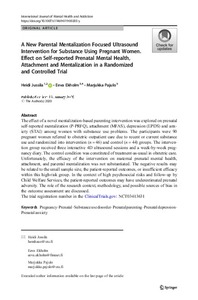A New Parental Mentalization Focused Ultrasound Intervention for Substance Using Pregnant Women. Effect on Self-reported Prenatal Mental Health, Attachment and Mentalization in a Randomized and Controlled Trial
Eeva Ekholm; Marjukka Pajulo; Heidi Jussila
https://urn.fi/URN:NBN:fi-fe2021042820809
Tiivistelmä
The effect of a novel mentalization-based parenting intervention was explored on prenatal self-reported mentalization (P-PRFQ), attachment (MFAS), depression (EPDS) and anxiety (STAI) among women with substance use problems. The participants were 90 pregnant women referred to obstetric outpatient care due to recent or current substance use and randomized into intervention (n = 46) and control (n = 44) groups. The intervention group received three interactive 4D ultrasound sessions and a week-by-week pregnancy diary. The control condition was constituted of treatment-as-usual in obstetric care. Unfortunately, the efficacy of the intervention on maternal prenatal mental health, attachment, and parental mentalization was not substantiated. The negative results may be related to the small sample size, the patient-reported outcomes, or insufficient efficacy within this high-risk group. In the context of high psychosocial risks and follow-up by Child Welfare Services, the patient-reported outcomes may have underestimated prenatal adversity. The role of the research context, methodology, and possible sources of bias in the outcome assessment are discussed.
Kokoelmat
- Rinnakkaistallenteet [19207]
